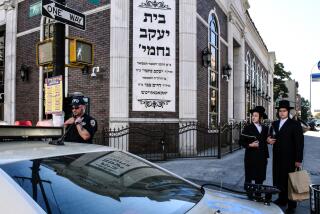62 U.S. Troops Injured in Iraq; Governor Is Fired
- Share via
BAGHDAD — The U.S.-led occupation of Iraq sustained hits on its military and civilian flanks Tuesday when 62 Americans were injured in three attacks and the Iraqi Governing Council defiantly announced the firing of a governor chosen by U.S. administrator L. Paul Bremer III.
Two suicide bombings targeted U.S. military facilities, the first one before dawn outside a compound in Tall Afar, near the northern city of Mosul, injuring 59 soldiers. The second occurred at a base in Husseiniya, 15 miles northeast of Baghdad, where a man blew himself up, wounding at least three soldiers.
Near Fallouja, a heavily fortified city an hour west of the capital, a rocket-propelled grenade struck one of two low-flying helicopters at 2:30 p.m., sending the OH-58D Kiowa and its two crewmen into an open field. A military spokesman described it as a “controlled landing” and said both soldiers walked away from the wreckage.
Politically more injurious to reconstruction efforts was the Governing Council’s declaration that it had fired the provincial governor of Babylon, Iskandar Jawad Witwit, who was appointed by Bremer in the summer. The council two weeks ago ordered Witwit removed on grounds of corruption and nepotism, but Bremer overruled the move.
The council Tuesday declared the army colonel dismissed on grounds that he was a member of the outlawed Baath Party and hence disqualified from high office. Babylon and its main city, Hillah, have been relatively calm and secure, factors that probably led Bremer to stick with an official presiding over a rare region of peace amid the occupation.
Witwit’s sacking follows weeks of rallies and wrangling. Witwit’s brother and security advisor, Muhanad Jawad, accused Governing Council member Ahmad Barak, also from Hillah, of seeking to oust the current governor to secure the regional power base for his own brother.
Barak, in an interview, dismissed the claim as nonsensical, noting that his brother already earns three times the governor’s salary as a deputy to the Governing Council. The holdover from the former regime needed to be ousted, Barak insisted, to demonstrate to the Iraqi people that the council, often criticized as a U.S. puppet, represents legitimate leadership of a sovereign nation.
“We must play this role in front of our people. We must do this for the Iraqi people, to show respect for the opinion of the Iraqi people,” Barak said.
In Tall Afar, the predominantly Turkmen city of 300,000 northwest of Mosul that was targeted by the first suicide bombing Tuesday, flying debris damaged several houses and the bomber’s remains were strewn hundreds of feet across the entrance to the base used by U.S. forces.
Balqis Mohammed, 34, a school principal, was sleeping in her house, 150 yards west of the military compound. “I woke up at the huge explosion around 5 o’clock in the morning,” she said. “The windows were totally broken, and 15 minutes later we heard many helicopters flying around.”
Mohammed said she did not believe the Americans had brought peace, much less security, to her city or to Iraq. “If [the U.S. forces] were welcome, they would not be attacked,” she said.
At the entrance to the base at Hasan Koy Street, Leith Saleh, 33, who owns a shop that sells sweets and nuts, said: “This is not resistance -- rather, it is sabotage. These are terrorists. Where were those people when Saddam [Hussein] was ruining the country? We have had enough suffering.”
The compound has been attacked at least twice before.
“I just do not understand what is going on. All I understand is that these operations do not serve us,” said Mousa Hussein, a 53-year-old retired teacher whose windows were blown out of his house by the force of the blast across the street. “Who is going to pay for this damage?”
Also Tuesday, the coalition reported that three U.S. soldiers from the 2nd Infantry Division died Monday when their armored vehicle crashed through an embankment north of Baghdad. Their deaths brought to 448 the number of U.S. troops reported killed since war began March 20.
The 25-member Governing Council ordered the expulsion of an Iranian-based organization aligned with Hussein during the Baathists’ 35-year rule. The Moujahedeen Khalq was ordered to cease all activities and leave Iraq by month’s end.
The group once claimed to have several thousand members, but many are thought to have fled Iraq since Hussein was toppled in the spring. Those factions still here are heavily armed and could resist the council’s order.
The Governing Council also called on citizens with Baath Party records in their hands -- mostly acquired during looting after the fall of Baghdad -- to surrender them to the council for use in prosecuting war criminals. The council was expected to disclose details of its planned war crimes tribunal today.
Meanwhile, at the United Nations, Secretary-General Kofi Annan is expected to name a veteran U.N. official, Ross Mountain, as his interim envoy to Iraq.
Mountain, an experienced U.N. humanitarian relief official from New Zealand, will temporarily take over the post left vacant after chief envoy Sergio Vieira de Mello was killed in the Aug. 19 bombing of the U.N.’s headquarters in Baghdad. He will be based in Amman, Jordan’s capital.
*
Times special correspondent Samir Zedan in Tall Afar and staff writer Maggie Farley at the United Nations contributed to this report.
More to Read
Sign up for Essential California
The most important California stories and recommendations in your inbox every morning.
You may occasionally receive promotional content from the Los Angeles Times.














